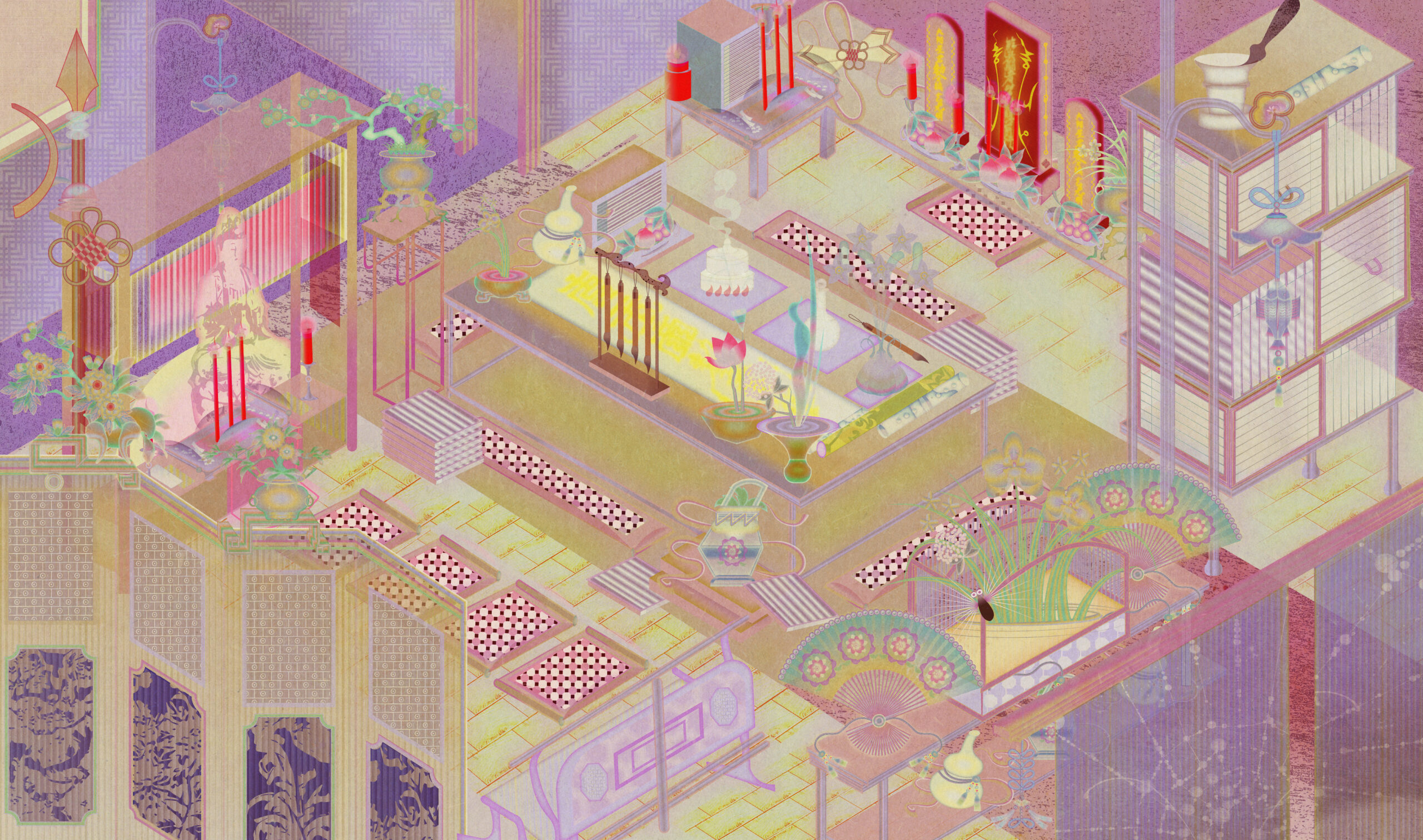LU YANG: LU YANG HELL
| December 1, 2010 | Post In LEAP 6

Lu Yang’s recent Shanghai solo exhibition—a series of works that straddles the two major topics of science and alternative culture—displays her works in simple, easily recognizable formats: sketched diagrams, stylized videos, lo-fi laser projections. The light, upbeat presentation of the exhibition actually serves to transform it into a profoundly ironic contemplation of our world; taken all together, the showcase reads like a sutra of contemporary society.
Lu Yang sums up her works—seven series altogether—from over the past two years in terms of “projects” and “programs.” The “projects”—those four series relating to themes of science and biology—include: “The Project of Seeking for Cooperation With Scientific Terms,” “The Project of New Century Projects,” “The Project of Beats Form Living Things,” and “Power of Will” [sic]. The three “programs,” on the other hand, are based on research into alternative subcultures: “Family DIY,” “Do it Yourself! Pervert Crime,” and the “Gay Series.” Although divided, the two bodies of work interrelate.
Her creative approach to the relationship between science and art is meticulous and strict. She will conduct a series of experiments in order to technically prove the possibility of finding or realizing one intricate, specialized piece of data. Only then will she take a certain form and convert it into a work. In her pieces treating the subject of science, “control” is the operative word; people and machines take on a complex dynamic of control versus resistance, as is the case with Interface for Monitoring Brain Activity in Classroom, where machines are used to probe people’s brains and to check in on their concentration and retention of information all in the name of “improving learning efficiency.” The implicit allegory of the work reflects upon a central question: with the advance of technology, what role does humankind stand to play, and what will the result be?
The video installation Laser Gay utilizes music videos and laser projections; the third segment of the “Will Power” series, it combines a low-tech, bizarre shanzhai quality with elements of gay culture in a way that is both utterly nonsensical and very much to the point. In dealing with the relationship between art and sexual culture, Lu Yang elects to use real-life social events as material and the homosexual body as a medium; she highlights the ironic contrast between gay males’ social identities and male sexuality as it corresponds to their bodies, a statement aimed most directly at unequal, patriarchal society. Indeed, Lu Yang’s own identity as a female puts her in the more vulnerable position as defined by this structure, but confronting gender issues via their externalization here is not her intent; the strange tale of society and the features of trendy gay culture are only one face of her work.
Lu Yang most often uses the body as a space for and means of creative exploration. Whether meddling with a micro-organism, an animal, a straight person, a gay person, or a machine, or intervening in the struggle and interaction between bodies, she diagrams and then dissects, experiments with, torments, abuses, or maltreats every entity. Sometimes she has bodies engage in extreme behavior, and other times she writes them into absurd plot lines. All the while, they come across as reasonable and natural-looking, because they are under the banner of “art.” “Family DIY” is a series bursting with even more irony; it provides step-by-step manuals instructing observers on how to make their own sanitary napkin gauze masks, peel off their own nipples, and use airplane life-rafts to kill themselves, among other unimaginably odd and unexpectedly inspiring “how-to’s.” Lu initially chose to convey all of these ideas with sketch diagrams because she was broke, and therefore had no way either to purchase professional equipment or hire staff to assist her in carrying them out. Now on display, the method inadvertently lends a serious air to the taboo content of her works, adding to the absurdity of it all. Weng Zhijuan

